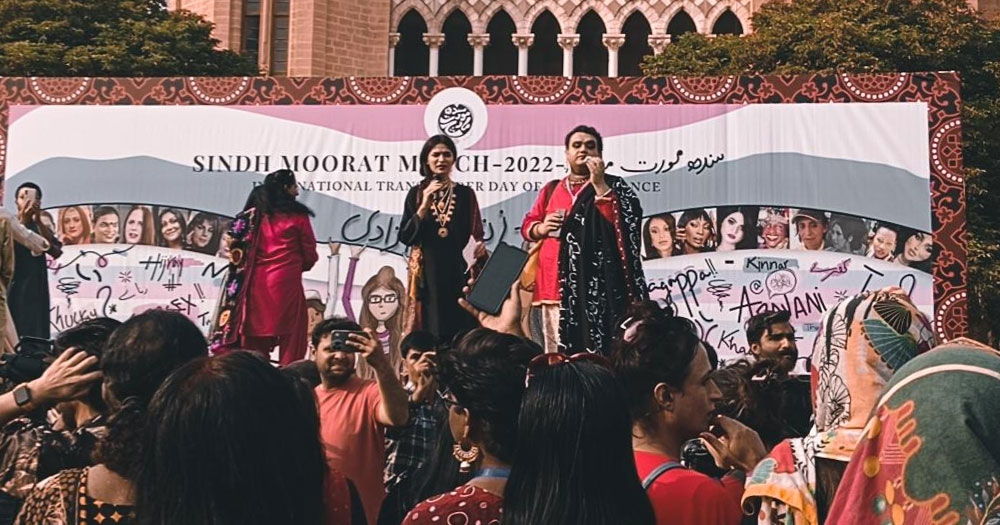On Sunday, November 20, members of the Khwaja Sira community, which encompasses trans, non-binary and gender non-conforming individuals, came together in the city of Karachi for the first-ever march of its kind in Pakistan, demanding equality and protection against hate speech.
Contrary to the widespread misconception that being trans is a Western idea imposed on other parts of the world, the Khwaja Sira community has a long history in Pakistan, dating back to the Mughal Empire of the 16th to 19th centuries. The community held a special place within the empire, they were trusted and respected, often holding positions of power and advisory roles.
However, they lost their status when the British East India Company colonised the Indian subcontinent and introduced the Criminal Tribes Act in 1871, which criminalised the existence of their community and contributed to their ostracisation. Discrimination and stigmatisation against the Khwaja Sira community, often also referred to as “third gender”, continued for the years to come and today they still face widespread marginalisation.
On Sunday, hundreds of people participated in the first Sindh Moorat (the indigenous term for trans) march to ever happen in Pakistan. Organised by the Gender Interactive Alliance (GIA), the march took place on Transgender Day of Remembrance, to commemorate the lives lost to anti-trans violence.
The Khwaja Sira community has faced growing violence in the last few years, which saw an increase in the number of hate crimes. As reported by Pakistan’s Trans-Action Alliance, 91 trans women have been murdered in Khyber Pakhtunkhwa province since 2015 and more than 2,000 cases of violence against the community were registered.
Tweeting again with pics via @samarfactor and Bhevish Maheshwari! I express solidarity with the participants of the Sindh Moorat March in Karachi. Despite the stigma faced by this community in Pakistan, they still strive for their rights. More power to them! #SMM2022 pic.twitter.com/wLs2jgHSvQ
— Bilal Farooqi (@bilalfqi) November 20, 2022
Moreover, they have recently had to face challenges to the victories that their movement managed to achieve in the past. In 2018, Pakistan passed the Transgender Persons Act, which gave the community the right to vote and self-determine their gender on official identity documents. Considered by some to be one of the most progressive trans rights bills in the world, the law recently came under threat when religious conservative political parties argued that it was “against Sharia” and the Council of Islamic Ideology issued a statement saying that it could be reversed.
Hina Baloch, one of the organisers of the march, said: “For decades, we were denied basic rights and now whatever rights that have been given are being snatched. On top of this, a media trial and disinformation campaign has been running in the country against us, resulting in more violence.”
Baloch also revealed how many of the organisers, as well as other trans activists, received threats to be “killed, with knives, bullets as well as threats of acid attacks and rape” due to their advocacy work.
Sindh Moorat March is extremely grateful to all the Khawajasira Community & allies, donors, volunteers, supporters, media & those who marched with us on ground & those who campaigned for us online.
Thank you so much for all your love and support! ??️⚧️✊#SMM2022 #TDoR2022 #TDOR pic.twitter.com/L7H4M60yC9
— Sindh Moorat March (@MooratMarch) November 21, 2022
Activist Arma Khan said: “We deserve to be treated equally and with respect but this must start from our families. A lot of the transgender community is persecuted. This must stop, society and the families should support their children”.
According to the statistics, the stigma and marginalisation faced by the Pakistani trans community leads to 42% of them being illiterate, and the lack of education forces them to resort to begging, sex work and dancing.
Elif Khan, a dancer who also joined the march, spoke up saying: “This is the first time that we are having such a march exclusively for our community – this fills me with pride. I am a dancer but I want to progress now, I want to get an education, I want to make an identity for myself”.
Organiser of the Sindh Moorat March have outlined a clear narrative and agenda about the rights of Transgender community of Sindh!#smm2022 pic.twitter.com/nSCDiOqcqm
— Daadlo (@DaadloSain) November 20, 2022
© 2022 GCN (Gay Community News). All rights reserved.
Support GCN
GCN is a free, vital resource for Ireland’s LGBTQ+ community since 1988.
GCN is a trading name of National LGBT Federation CLG, a registered charity - Charity Number: 20034580.
GCN relies on the generous support of the community and allies to sustain the crucial work that we do. Producing GCN is costly, and, in an industry which has been hugely impacted by rising costs, we need your support to help sustain and grow this vital resource.
Supporting GCN for as little as €1.99 per month will help us continue our work as Ireland’s free, independent LGBTQ+ media.
